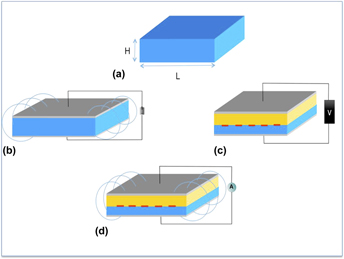Crossref Citations
This article has been cited by the following publications. This list is generated based on data provided by
Crossref.
Li, Xiaobao
Liu, Liping
and
Sharma, Pradeep
2016.
A new type of Maxwell stress in soft materials due to quantum mechanical-elasticity coupling.
Journal of the Mechanics and Physics of Solids,
Vol. 87,
Issue. ,
p.
115.
Kumar, Deepak
and
Sarangi, Somnath
2018.
Instability analysis of an electro-magneto-elastic actuator: A continuum mechanics approach.
AIP Advances,
Vol. 8,
Issue. 11,
Alameh, Zeinab
Yang, Shengyou
Deng, Qian
and
Sharma, Pradeep
2018.
Emergent magnetoelectricity in soft materials, instability, and wireless energy harvesting.
Soft Matter,
Vol. 14,
Issue. 28,
p.
5856.
Hu, Taotao
Chen, Lijun
and
Mao, Wei
2019.
Atomistic modeling of flexoelectricity in amorphous polymers.
Journal of Molecular Graphics and Modelling,
Vol. 92,
Issue. ,
p.
147.
Darbaniyan, Faezeh
Dayal, Kaushik
Liu, Liping
and
Sharma, Pradeep
2019.
Designing soft pyroelectric and electrocaloric materials using electrets.
Soft Matter,
Vol. 15,
Issue. 2,
p.
262.
Apte, Amey
Mozaffari, Kosar
Samghabadi, Farnaz Safi
Hachtel, Jordan A.
Chang, Long
Susarla, Sandhya
Idrobo, Juan Carlos
Moore, David C.
Glavin, Nicholas R.
Litvinov, Dmitri
Sharma, Pradeep
Puthirath, Anand B.
and
Ajayan, Pulickel M.
2020.
2D Electrets of Ultrathin MoO2 with Apparent Piezoelectricity.
Advanced Materials,
Vol. 32,
Issue. 24,
Tan, Kai
Wen, Xin
Gong, Xun
Deng, Qian
and
Shen, Shengping
2020.
Diversifying temporal responses of magnetoactive elastomers.
Materials Research Express,
Vol. 7,
Issue. 4,
p.
045702.
Tan, Kai
Wen, Xin
Deng, Qian
Shen, Shengping
Liu, Liping
and
Sharma, Pradeep
2021.
Soft rubber as a magnetoelectric material—Generating electricity from the remote action of a magnetic field.
Materials Today,
Vol. 43,
Issue. ,
p.
8.
Shi, Yang
Li, Yong
Xu, Jin
Li, Ni
and
Shi, Baoquan
2022.
Insights into the novel magnetoelectric coupling mechanism in soft materials due to Maxwell interactions.
Physics Letters A,
Vol. 433,
Issue. ,
p.
128028.
Rahmati, Amir Hossein
Liu, Liping
and
Sharma, Pradeep
2022.
Homogenization of electrets with ellipsoidal microstructure and pathways for designing piezoelectricity in soft materials.
Mechanics of Materials,
Vol. 173,
Issue. ,
p.
104420.
Rahmati, Amir Hossein
Jia, Rong
Tan, Kai
Zhao, Xuanhe
Deng, Qian
Liu, Liping
and
Sharma, Pradeep
2023.
Theory of hard magnetic soft materials to create magnetoelectricity.
Journal of the Mechanics and Physics of Solids,
Vol. 171,
Issue. ,
p.
105136.
Krichen, Sana
and
Alameh, Zeinab
2023.
Magnetic and ionic liquid inclusions in soft materials and engineering enhanced electro-magneto-mechanical response.
International Journal of Solids and Structures,
Vol. 262-263,
Issue. ,
p.
112081.
Rahmati, Amir Hossein
Jia, Rong
Tan, Kai
Liu, Liping
Zhao, Xuanhe
Deng, Qian
and
Sharma, Pradeep
2023.
Giant magnetoelectricity in soft materials using hard magnetic soft materials.
Materials Today Physics,
Vol. 31,
Issue. ,
p.
100969.
Tan, Kai
Jia, Rong
and
Deng, Qian
2024.
A tunable self-bias effect in rubbery magnetoelectric materials.
AIP Advances,
Vol. 14,
Issue. 10,
Zhang, Shanfei
Li, Zhuofan
Xu, Yizhuo
and
Su, Bin
2024.
Flexible magnetoelectric systems: Types, principles, materials, preparation and application.
Applied Physics Reviews,
Vol. 11,
Issue. 4,
